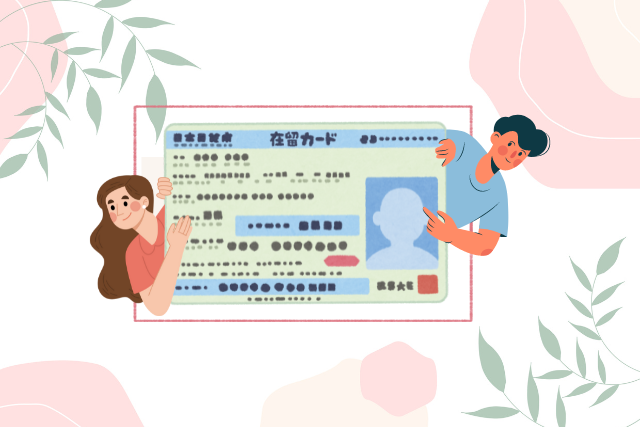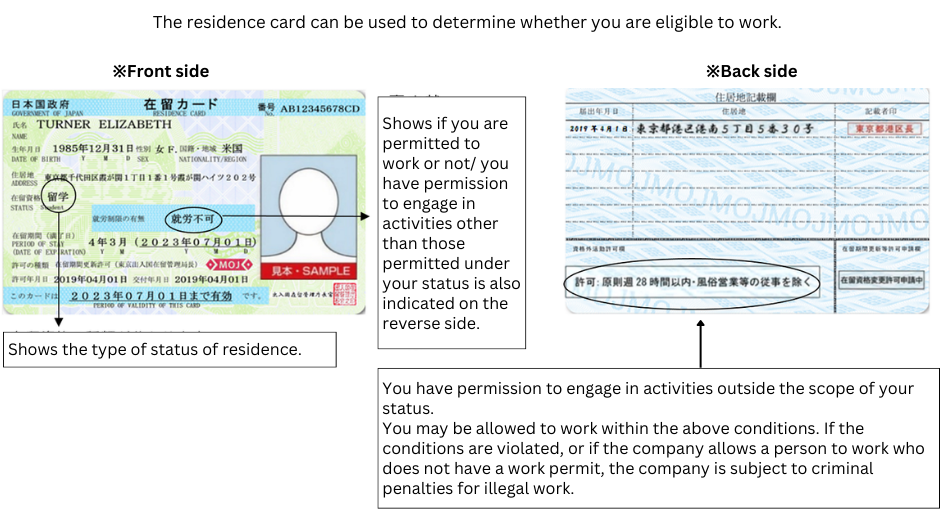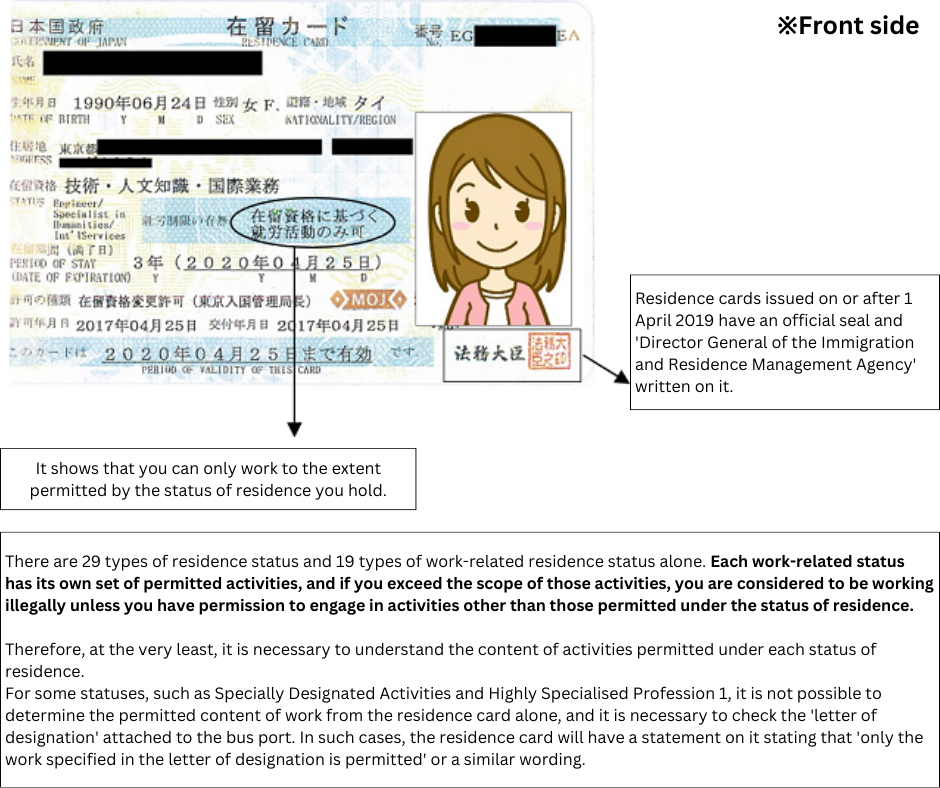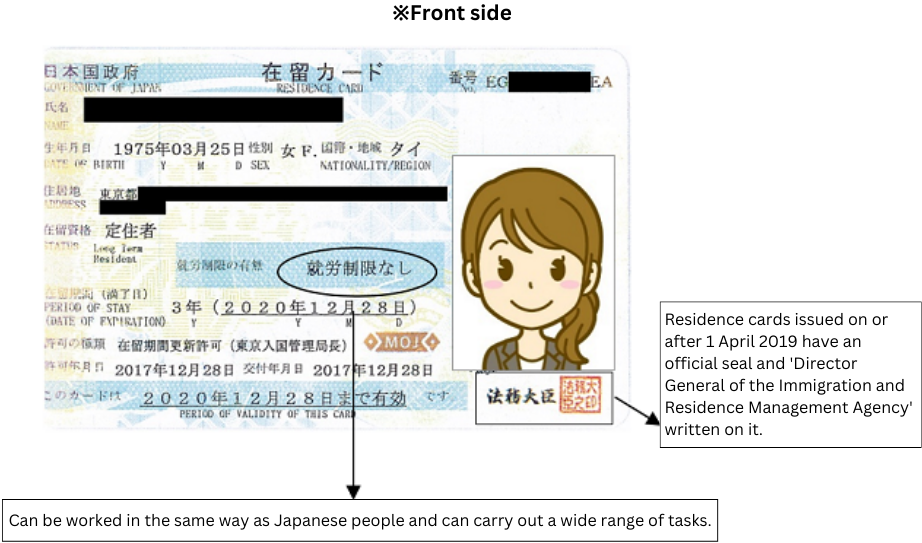Global Career Guide


- Jobs in Japan @ Daijob.com
- Global Career Guide
- Expat Essentials
- Resident Card 101
Resident Card 101

In Japan, having a residence card is crucial for foreign nationals living and working in Japan. This comprehensive guide explains the significance of the residence card, emphasizing the importance of keeping it on your person at all times. Additionally, we provide essential information on handling your residence card, steps to take if it gets lost or damaged, and why it is crucial for you to retain possession of your passport and residence card.
The residence card is an important form of identification. Your residence card contains key information such as your personal details, residence status, validity period, and work permissions. The card can be used as an ID when you carry out an official procedure at the local government or enter into a contract.
A person who is 16 years and over must carry their residence card at all times.
Failure to carry the required identification documents, such as a residence card, may result in legal repercussions. This can include fines, penalties, or even detention if your immigration status is called into question. Not having your residence card readily available may create challenges in various aspects of daily life, such as opening bank accounts, renting accommodations, or accessing certain services that require proof of legal residency.
How to read and interpret the residence card
■ International students

Image source: Immigration Services Agency website
◆ Work visa
Let’s take a look at the residence card for [technical, humanities, and international services] as a typical work visa.


◆ Permanent residents, spouses, and other visas
Some visas do not restrict employment, allowing the holder to do any kind of work. “Permanent resident”, “Spouse or Child of a Japanese National”, “Spouse or Child of a Permanent Resident” and “Permanent Resident” fall under this category.

The fact that there are no work restrictions means that you can do any kind of work, just like Japanese nationals. However, it is a given that you must not do any work that is against the law. If this is violated, your visa will be canceled and you will be deported.
What to Do If You Lose or Damage Your Residence Card
◆ If you have lost your residence card or it has been damaged and rendered unusable, there is a process you can follow to obtain a new one from the Immigration Bureau (Immigration and Naturalization Services). In such cases, you will need to provide the police-issued “Report of Loss” or “Report of Theft” if it was lost or stolen, or the “Disaster Victim Certificate” issued by the municipal office if it was lost due to a disaster. Make sure to obtain these documents and keep them safe. If you are unable to obtain these certificates, you will need to explain the situation to the Immigration Bureau in writing.
For more details check the Immigration website: If you have lost your residence card
◆ If your residence card is soiled and can no longer be used, you can also get a new residence card from the immigration office. In this case, please take the soiled residence card to the immigration office and get a new residence card.
For more details check the Immigration website: If you have lost your residence card
What to do if your employer asks you to surrender your passport and residence card
You should always keep your residence card with you. If you go outside without carrying your residence card, you violate the law. If you are stopped by the police and cannot present your residence card, it can lead to serious consequences. If your employer asks you to surrender your passport and residence card, ask for the reason behind their request. They should not be allowed by law to hold your passport and residence card. The reason behind your employer’s request is to ensure that you cannot escape. However, their approach is incorrect. If they do not want you to escape, they should create a conducive work environment where you can work happily (of course, running away without reason is also not advisable). If your employer insists on keeping your passport and residence card and refuses to return them, consult the Labor Standards Inspection Office, Immigration Bureau, or legal experts for assistance.
For more details check the Labour Welfare Ministry website
When It Is Acceptable to Surrender Your Residence Card and Passport?
Earlier, we mentioned that it is safe to keep your passport at home, but you should always carry your residence card with you when going out. We also mentioned that your employer should not hold your passport or residence card. However, there are cases where companies, registration support organizations with authority to handle immigration qualification changes or renewals, administrative scriveners, lawyers, and other legal professionals who have broad authority in immigration procedures for foreigners may temporarily hold your residence card and passport (make sure to receive a “receipt” with the name and contact information of the recipient, and a copy of the residence card). However, they should only hold them when applying on your behalf or receiving a new residence card on your behalf. Apart from those instances, make sure to have your residence card and passport returned to you properly.
With this comprehensive guide, you now understand the significance of your residence card in Japan and the importance of always carrying it. By following the proper procedures in case of loss or damage and asserting your rights regarding your passport and residence card, you can ensure a smooth and secure experience while living and working in Japan.
※Translated from a Japanese article. Find the original article here.
Discover Your Next Role in Japan. Access more than 10,000 jobs for free!


